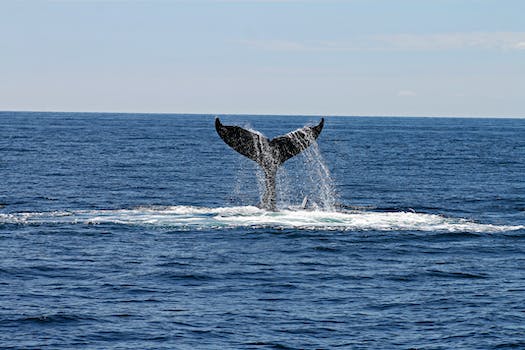-
Table of Contents
- Whale Bitten in Half: A Shocking Encounter
- The Incident: A Whale’s Tragic Fate
- Possible Culprits: Predators of the Deep
- The Implications for Marine Ecosystems
- Preventing Future Attacks
- Q&A
- 1. Are there any documented cases of whales defending themselves against predators?
- 2. How common are attacks on whales?
- 3. Can humans be considered a threat to whales?
- 4. What can individuals do to contribute to whale conservation?
- 5. How long does it take for a whale carcass to decompose?
- Conclusion

Whales, the majestic creatures of the deep, have always fascinated and captivated humans. Their immense size, intelligence, and mysterious nature make them a subject of awe and wonder. However, there are instances when the tables turn, and these gentle giants become victims of brutal attacks. One such shocking incident is the case of a whale being bitten in half. In this article, we will delve into this extraordinary event, exploring the possible culprits, the implications for marine ecosystems, and the measures being taken to prevent such incidents in the future.
The Incident: A Whale’s Tragic Fate
In recent years, reports of whales being bitten in half have surfaced, leaving scientists and marine experts puzzled. One such incident occurred off the coast of South Africa, where a humpback whale was found severed in two. The sheer brutality of the attack shocked researchers, who were left searching for answers.
Possible Culprits: Predators of the Deep
When it comes to the question of who could be responsible for such a gruesome attack, several potential culprits come to mind. Let’s explore some of the most likely predators of the deep:
- Orcas (Killer Whales): Known for their intelligence and hunting prowess, orcas are often at the top of the suspect list. These apex predators have been observed hunting in coordinated groups, targeting larger prey such as whales.
- Great White Sharks: With their razor-sharp teeth and powerful jaws, great white sharks are formidable predators. While they typically feed on seals and smaller fish, there have been instances of them attacking larger marine mammals.
- Sperm Whales: These deep-diving giants are known to have a taste for squid, but they have also been observed engaging in aggressive behavior towards other whale species. Could they be responsible for the gruesome attacks?
While it is difficult to pinpoint the exact culprit without concrete evidence, these predators remain the primary suspects in cases of whales being bitten in half.
The Implications for Marine Ecosystems
When a whale falls victim to such a brutal attack, it has far-reaching consequences for the marine ecosystem. Whales play a crucial role in maintaining the balance of the oceanic food chain. Their carcasses provide sustenance for a variety of scavengers and deep-sea organisms, contributing to the overall health of the ecosystem.
However, when a whale is bitten in half, the scavenging process becomes disrupted. The carcass sinks to the ocean floor, depriving many organisms of their primary food source. This disruption can have cascading effects on the entire ecosystem, leading to imbalances and potentially impacting other marine species.
Preventing Future Attacks
Given the potential consequences of such attacks, efforts are being made to prevent future incidents and protect these magnificent creatures. Here are some measures being taken:
- Increased Surveillance: Researchers and marine experts are utilizing advanced tracking technologies to monitor the movements of predators and detect any unusual behavior patterns that may indicate a potential threat to whales.
- Education and Awareness: Raising awareness among the general public about the importance of marine conservation and the need to protect whales can help foster a sense of responsibility towards these creatures.
- Protected Marine Areas: Establishing protected marine areas where whales can thrive without the fear of predation can provide a safe haven for these majestic creatures.
Q&A
1. Are there any documented cases of whales defending themselves against predators?
Yes, there have been documented cases of whales defending themselves against predators. In some instances, whales have been observed using their powerful tails to strike back at their attackers, potentially deterring them from further aggression.
2. How common are attacks on whales?
Attacks on whales are relatively rare, but they do occur. While whales are generally not the preferred prey of most predators, instances of attacks have been reported in various parts of the world.
3. Can humans be considered a threat to whales?
While humans are not typically responsible for attacking whales, they do pose a significant threat to these creatures through activities such as pollution, entanglement in fishing gear, and collisions with ships. These human-induced threats can have severe consequences for whale populations.
4. What can individuals do to contribute to whale conservation?
Individuals can contribute to whale conservation by supporting organizations and initiatives dedicated to protecting marine ecosystems and advocating for responsible whale-watching practices. Additionally, reducing plastic consumption and properly disposing of waste can help prevent pollution that harms whales and other marine life.
5. How long does it take for a whale carcass to decompose?
The decomposition process of a whale carcass can vary depending on various factors such as water temperature, depth, and the presence of scavengers. In general, it can take several months to a few years for a whale carcass to fully decompose.
Conclusion
The shocking incidents of whales being bitten in half serve as a stark reminder of the harsh realities of the natural world. While the exact culprits may remain elusive, the implications for marine ecosystems are clear. Protecting these magnificent creatures and preserving the delicate balance of our oceans should be a priority for all. By increasing surveillance, raising awareness, and establishing protected marine areas, we can work towards preventing future attacks and ensuring the survival of these gentle giants for generations to come.




